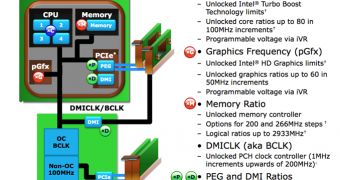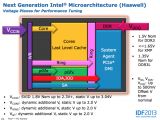One problem that some people have with the Ivy Bridge series of Intel CPUs is that they can't really be overclocked, unless they have the “K” suffix denoting an unlocked multiplier. Haswell won't have this limitation, Intel has revealed.
Last week, Intel held the Intel Developer Forum event in Beijing, China, where it ran a seminar on the Haswell micro-architecture.
What some may not have heard, though, is that a second seminar was held, one that described how a Haswell CPU could be overclocked.
It will do people's hearts good to know that they will be able to overclock chips besides the K-series.
That means that they won't need lots of cash to buy a high-end, unlocked unit, as, in theory, even Core i3 chips will be tweakable, in a manner similar to the Sandy Bridge-E HEDT platform (high-end desktop).
First off, there will be three base frequencies to which a multiplier can be applied: 100 MHz, 125 MHz, and 166 MHz.
The various uncore frequency ratios will adjust themselves to compensate, thus leaving their stability unaffected, provided overclockers don't modify the base clock by more than 7% (beyond which the PCI-Express and DMI-PLL clock domains lose stability).
Haswell will have integrated voltage regulation too (iVR), giving each CPU an integrated VRM controller, removing yet another asset of motherboards, although there will still be a need for their high-grade chokes, capacitors, and FETs (VRM components) for 8 GHz feats and such.
For those seeking more details on iVR, it makes motherboards provide chips with energy through just two power domains: vCCIN and vDDQ. In other words, it makes VRM circuitry and manipulation more standardized.
That said, unlocked “-K” chips still have an advantage, and are the only ones with odds to reach the 8 GHz record. Their base clock multiplier for the CPU cores are higher than on the others, of up to 80.0x for 100 MHz, up to 64.0x for 125 MHz, and up to 48.0x for 166 MHz.

 14 DAY TRIAL //
14 DAY TRIAL // 



